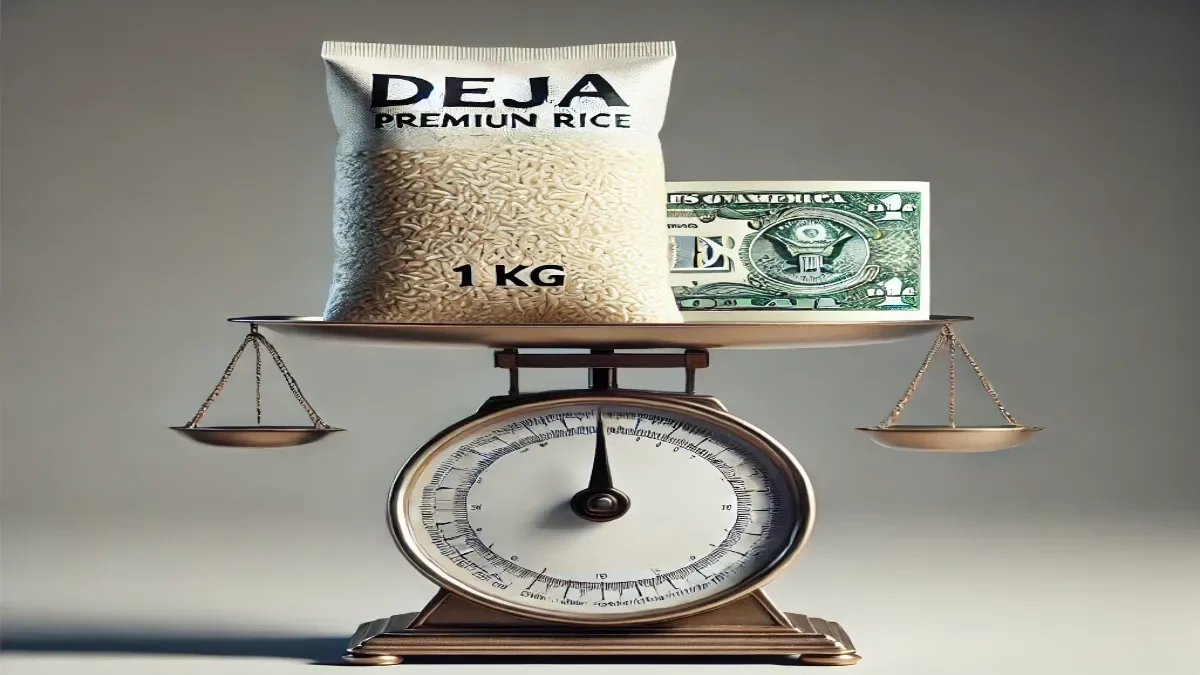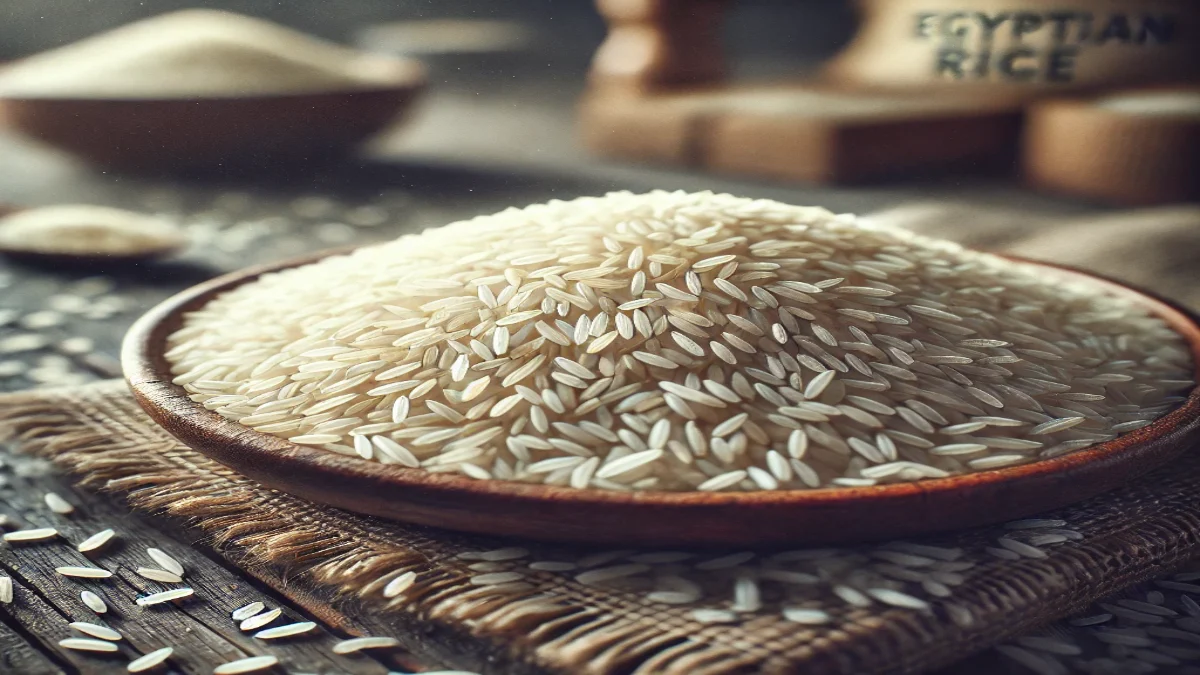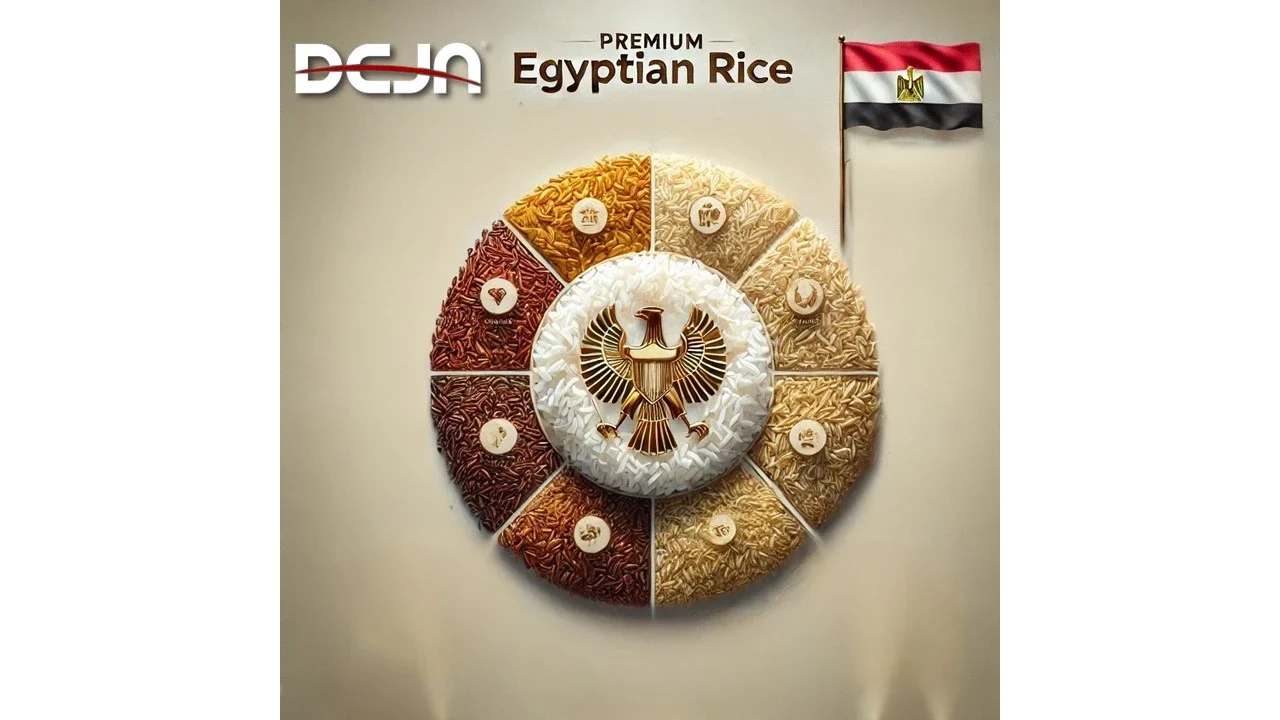Premium Egyptian Rice Prices – Rice Export Prices – Wholesale Rice Prices – Rice Price Per Ton – Rice Market Trends
Unlock the Authentic Taste of Egypt – Buy Now at Unbeatable Prices! Order Now or Chat with Us on WhatsApp for More Info!
Introducing Deja Premium Egyptian Rice Prices
The global rice market has recently seen significant changes, with Egyptian rice leading the premium segment. Deja Premium Egyptian Rice, produced by Eurovan Trading Company, offers unmatched quality and competitive prices. Consumers and businesses must understand the factors affecting the Premium Egyptian Rice price and current market trends. Gaining this knowledge of prices empowers informed decisions, whether for personal use or large-scale wholesale rice for import/export.
The Current Landscape of Wholesale Egyptian Rice Export Prices
Deja’s wholesale export rice prices average range is $1,000 USD per metric ton – $1,500 USD per metric ton (FOB), reflecting its premium status in the global market. This price range positions Deja as a competitive option within the premium rice category, offering both quality and affordability. Several factors influence this pricing, including the cost of production, packaging, and order volume.
For instance, larger wholesale orders of rice tend to receive more competitive prices, as bulk packaging reduces the per-unit cost. Additionally, custom packaging options can impact the final price, with specialized packaging often adding to the cost. The geographical location of the buyer also plays a role in determining the final price, especially when considering shipping and logistics expenses.
The Egyptian government plays a significant role in regulating rice prices through policies that impact production and export. Subsidies, taxes, and trade agreements can all influence the cost structure, making it important for buyers to stay informed about any regulatory changes that could affect pricing.

Connect with Us on WhatsApp – We’re Just a Message Away!
Egyptian Rice Price Today: What Buyers Need to Know
In today’s fast-paced market, the price of Egyptian rice is subject to daily fluctuations. These fluctuations are driven by several factors, including global demand, agricultural yields, and international trade policies. As of 2024, the Egyptian rice price today remains stable around $1 USD per kilogram, but it is essential to monitor these factors closely.
Global demand for premium rice, particularly from countries in the Middle East, Europe, and Asia, has steadily increased. This rising demand has contributed to maintaining the price of Deja Premium Egyptian Rice within the current range. Additionally, agricultural yields in Egypt have remained consistent, thanks to the country’s advanced irrigation techniques and fertile soil, particularly in the Nile Delta region.
However, buyers should be aware of potential disruptions that could impact prices. For instance, climate change poses a significant threat to agricultural production worldwide, and Egypt is no exception. Changes in rainfall patterns, extreme weather events, and water scarcity could all affect future rice yields, leading to price increases.
Furthermore, international trade policies and tariffs can influence rice prices. For example, changes in export tariffs or import restrictions in major rice consuming countries could alter the dynamics of the global rice market and affect the prices dramatically. Buyers should keep an eye on such developments to time their purchases effectively.
Premium Egyptian Rice Export Price: Analyzing the Numbers
Exporting Wholesale Deja Premium Egyptian Rice involves several additional costs that influence the final export prices. These costs include transportation, tariffs, customs duties, and insurance, all of which can vary depending on the destination country. Despite these additional expenses, Deja has maintained competitive export pricing, ensuring that international buyers receive excellent value for their investment.
Deja Premium Egyptian Rice export prices are negotiated based on order size, packaging, and destination. Buyers from countries with favorable trade agreements with Egypt often enjoy lower tariffs, reducing costs. Bulk orders also receive discounts, making Deja a cost-effective choice for large-scale importers.
Transportation costs are another crucial factor in determining the export price. Shipping by sea is the most common method for exporting rice, with costs varying based on the distance, shipping route, and the availability of cargo space. Deja works with reliable shipping partners to ensure timely and cost-effective delivery, further enhancing its appeal in the international market.
It’s also important to consider the impact of currency exchange rates on rice export prices. Fluctuations in exchange rates can affect the final cost for buyers in different countries. For instance, a weakening of the Egyptian pound against the US dollar could make Deja Premium Egyptian Rice more affordable for buyers in the US, while a strengthening pound could have the opposite effect.
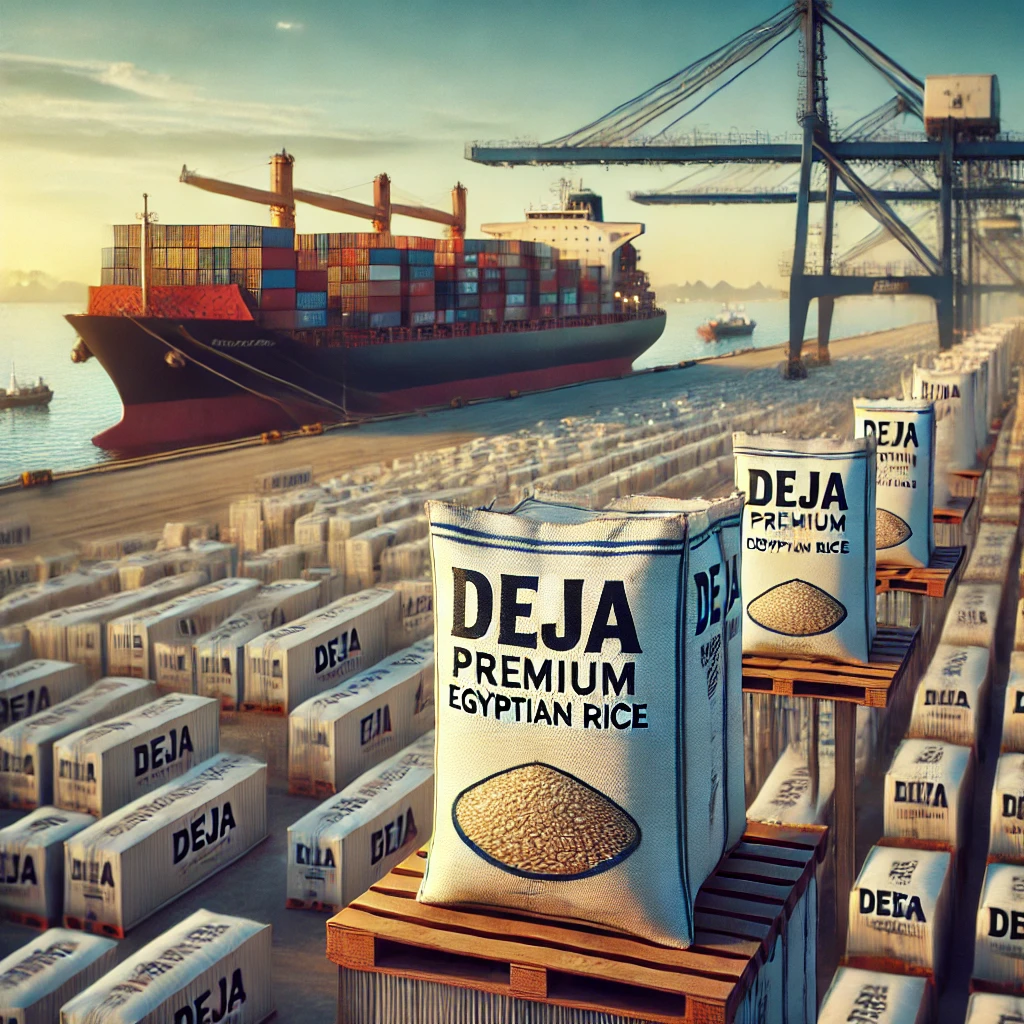
Need Assistance? Reach Out via WhatsApp for Instant Support!
Egyptian Rice Market Trends: A Look into the Future
The Egyptian rice market is growing, driven by key trends shaping its future. The rising global demand for high-quality grains, like Deja Premium Egyptian Rice, reflects consumers’ increasing health consciousness and preference for nutritious, flavorful options.
Technological advancements, such as precision agriculture, are optimizing crop yields and reducing waste. These innovations help Egyptian farmers meet growing demand while maintaining high-quality standards.
Sustainable agriculture is gaining importance as climate change threatens global food security. In Egypt, improved water management and eco-friendly practices are ensuring the long-term sustainability of rice production.
Globalization is expanding the market reach of Egyptian rice, making it more accessible worldwide. Deja and other brands are seizing these opportunities to grow their market share.
Shifting consumer preferences towards healthier, natural food options, especially in Europe and North America, align with Deja Premium Egyptian Rice’s offerings of natural, nutrient-rich products.
Wholesale Egyptian Rice Price: Balancing Cost and Quality
Understanding wholesale Egyptian rice prices is crucial for businesses to maximize value and understand the market trends. Wholesale prices offer significant cost advantages, making them ideal for distributors, retailers, and food manufacturers.
Securing the best price depends on several factors. Strong buyer-supplier relationships often lead to better pricing, especially with long-term partners. Eurovan Trading Company, the producer of Deja Premium Egyptian Rice, values these relationships and offers competitive prices to regular, large-volume buyers.
Order volume is another key factor. Larger orders usually result in better pricing due to economies of scale. Bulk packaging, like 50kg bags, further reduces per-unit costs, making wholesale rice prices more cost-effective.
Timing is also important. Seasonal fluctuations can lower prices during harvest seasons when supply is high. Planning purchases around these trends can help secure better deals.
Finally, choosing a reputable supplier like Eurovan Trading Company ensures high-quality rice at competitive prices, making them a reliable partner for wholesale buyers.
Egyptian Rice Suppliers: Choosing the Right Partner
Choosing the right Egyptian rice supplier is critical for businesses in the rice trade. Key factors include rice quality, supplier reliability, market trends, and meeting specific needs. Eurovan Trading Company, producer of Deja Premium Egyptian Rice, is known for quality and customer satisfaction.
Consider a supplier’s market track record. Eurovan consistently delivers high-quality rice, supported by strict quality controls. The ability to meet specific needs is vital. Eurovan offers various packaging options and customizes orders to ensure a smooth experience.
Logistics and supply chain management are crucial. Eurovan partners with reliable logistics providers for timely deliveries, regardless of order size. Customer service also matters. Eurovan’s responsive team ensures a positive experience from order placement to delivery.
Best Quality Egyptian Rice: What Sets Deja Apart
Deja Premium Egyptian Rice is distinguished by its exceptional quality, which begins with the very soil in which it is grown. The fertile lands of the Nile Delta provide the perfect environment for cultivating rice with superior taste and nutritional value. Deja rice is known for its unique combination of long, slender grains that cook to a fluffy, non-sticky texture. This is a result of the meticulous farming practices employed by Eurovan Trading Company, ensuring that each grain retains its natural properties.
Commitment to Quality
Deja’s commitment to quality extends beyond the fields. The company employs rigorous quality control measures throughout the production process, from harvesting to packaging. Every batch of rice undergoes multiple inspections to ensure it meets the highest standards. This attention to detail is what makes Deja Premium Egyptian Rice a favorite among consumers who prioritize quality.
Quality Nutrition
The nutritional benefits of Deja Premium Egyptian Rice are another factor that sets it apart. Rich in essential vitamins and minerals, Deja rice is not just a staple food but a source of balanced nutrition. It is particularly high in B vitamins, which are crucial for energy metabolism and overall health. The rice is also low in fat and contains no cholesterol, making it a heart-healthy choice for consumers.
Taste the Quality
In addition to its nutritional benefits, Deja rice is prized for its flavor. The grains have a subtle, aromatic taste that complements a wide variety of dishes, from traditional Egyptian meals to international cuisine. This versatility has made Deja Premium Egyptian Rice a popular choice among chefs and home cooks alike.
Packaging Quality
Furthermore, Deja rice is available in various packaging options to suit different consumer needs. Whether you’re looking for a 5kg bag for home use or larger quantities for commercial purposes, Eurovan Trading Company offers flexible packaging solutions. This ensures that Deja rice remains fresh and flavorful, no matter how it’s stored or transported.
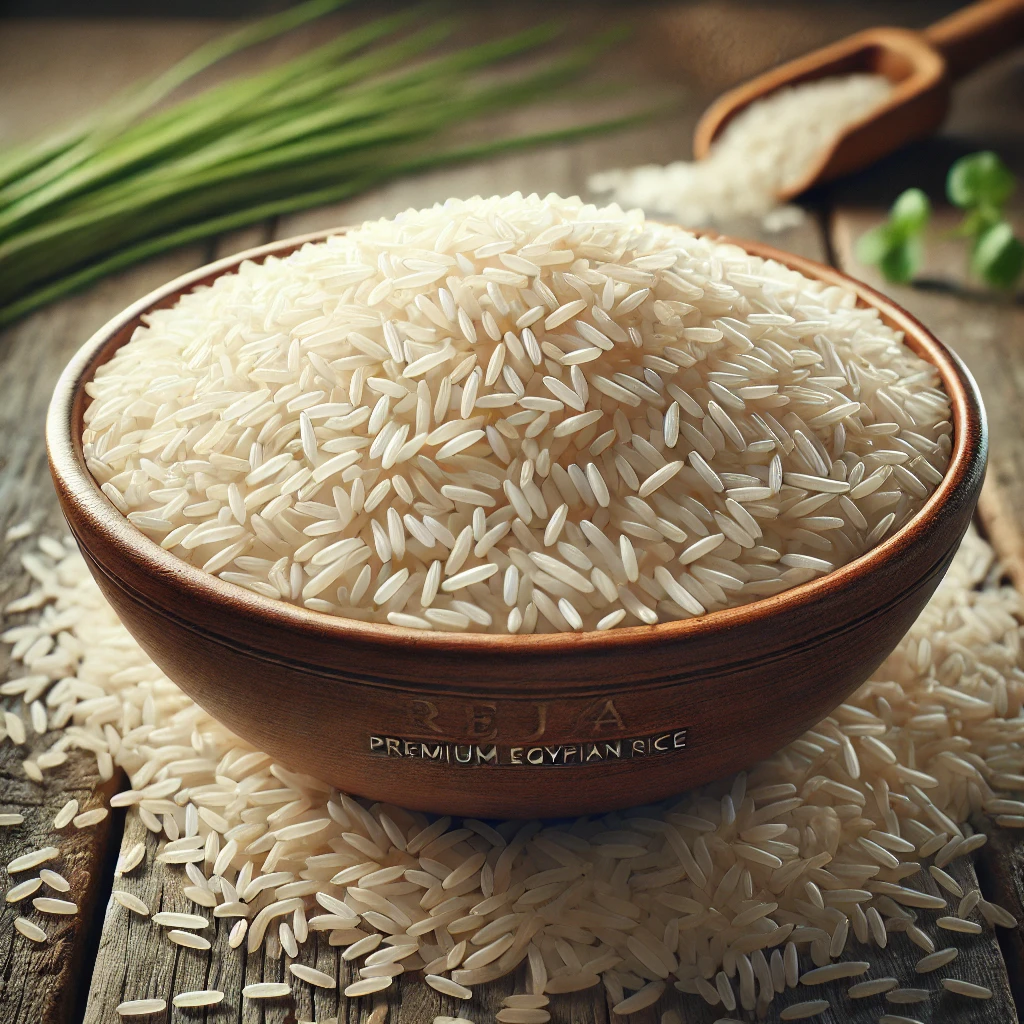
Order Now or Chat with Us on WhatsApp for More Info!
Egyptian Rice Price Per Ton: Understanding the Pricing Structure
The pricing structure of Egyptian rice is a reflection of multiple factors affecting market trends, each contributing to the final price per ton. Deja Premium Egyptian Rice, priced between $1,000 and $1,500 per metric ton FOB, offers a competitive edge in the market, especially when considering its premium quality.
Factors that Affect Deja Premium Egyptian Rice Prices
Production costs are a primary factor in determining the price per ton. These costs include everything from seed selection and planting to harvesting and processing. In Egypt, rice production benefits from the country’s favorable agricultural conditions, which help keep production costs relatively low compared to other regions. However, the emphasis on quality in the production of Deja Premium Egyptian Rice means that there are additional costs associated with ensuring that the rice meets strict quality standards.
Another factor influencing the price per ton is market demand. As the demand for premium rice varieties like Deja continues to rise, the market price reflects this increased interest. This is particularly true in regions where consumers are willing to pay a premium for high-quality rice with superior flavor and nutritional benefits.
Global Factors that Affect the Price
Global rice prices also play a role in determining the price per ton of Egyptian rice. As a globally traded commodity, rice prices are influenced by international market conditions, including supply and demand dynamics, currency exchange rates, and geopolitical factors. For example, a surge in demand from major importing countries can drive up global rice prices, affecting the price of Deja Premium Egyptian Rice.
Packaging and transportation costs are also important considerations in the pricing structure. The choice of packaging, whether in small consumer-friendly bags or larger bulk packaging, impacts the final price. Additionally, transportation costs, including shipping and logistics, can vary depending on the destination. For export markets, these costs are factored into the FOB (Free on Board) price, which includes all charges up to the point where the rice is loaded onto the shipping vessel.
Egyptian Rice Import/Export Data: Insights for Global Traders
For global traders, understanding the import/export dynamics of Egyptian rice is crucial for making informed decisions. Deja Premium Egyptian Rice is a significant player in the international rice trade, with export data reflecting its strong presence in key markets.
Export & Import Insights
Export volumes of Egyptian rice have been on the rise, driven by growing demand in regions such as the Middle East, Europe, and Africa. Deja has been at the forefront of this trend, capitalizing on its reputation for quality and reliability. The latest export data indicates that Deja Premium Egyptian Rice is particularly popular in countries that prioritize high-quality grains, such as Saudi Arabia, the UAE, and Italy.
On the import side, countries that rely heavily on rice imports for their food supply are increasingly turning to Egyptian rice to meet their needs. Deja has established itself as a trusted supplier in these markets, offering a product that meets the stringent quality standards of international buyers. Import data shows that Deja Premium Egyptian Rice is often preferred for its consistent quality and competitive pricing.
Global Market Insights
Trade agreements, market trends, and tariffs play a significant role in the import/export dynamics of Egyptian rice. Egypt has entered into several trade agreements that facilitate the export of rice to key markets, reducing or eliminating tariffs and other trade barriers. These agreements make Deja rice more accessible to international buyers, enhancing its competitiveness in the global market.
Another important aspect of the import/export data is the logistics and supply chain efficiency. Deja benefits from a well-established logistics network that ensures timely delivery of rice to its international clients. This reliability is a key factor in the brand’s success, as it helps maintain customer satisfaction and repeat business.
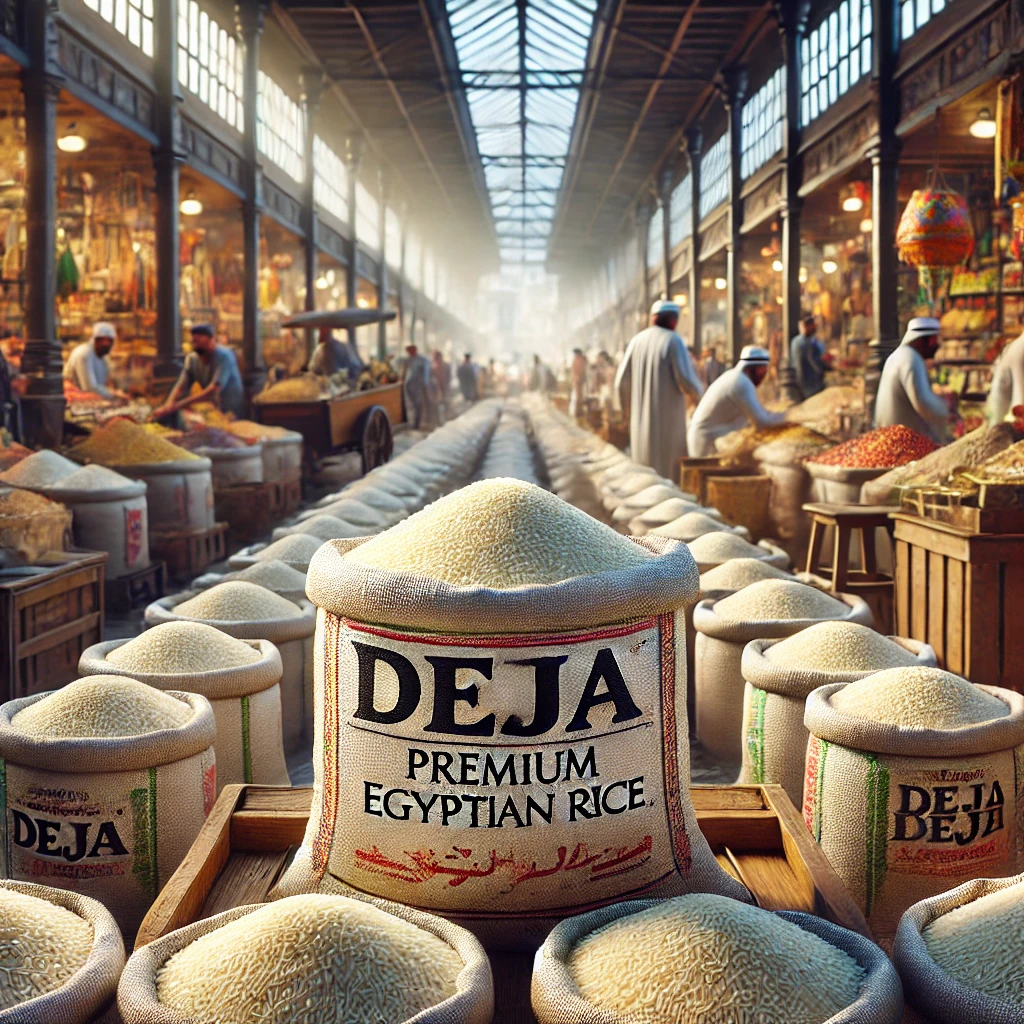
Got Questions? Contact Us by WhatsApp – We’re Here to Help!
Conclusion
As the global demand for premium rice continues to grow, understanding the intricacies of Premium Egyptian Rice prices and market trends becomes increasingly important. Whether you are a consumer, retailer, or international trader, staying informed about the latest trends and pricing structures will enable you to make the best purchasing decisions.
Deja Premium Egyptian Rice, produced by Eurovan Trading Company, stands out as a top choice in the market, offering exceptional quality at a competitive price. From its cultivation in the fertile Nile Delta to its meticulous processing and packaging, Deja rice exemplifies the best of Egyptian agriculture. By choosing Deja, you are not only investing in a product of superior quality but also supporting sustainable farming practices that contribute to the long-term health of the environment.
In a world where quality and authenticity are increasingly valued, Deja Premium Egyptian Rice offers a unique blend of tradition and modernity, making it the preferred choice for those who seek the best in their food.
Key Takeaways
- Deja Premium Egyptian Rice offers excellent value for money within the premium rice segment.
- Prices range from $1,000 to $1,500 per metric ton FOB, with larger orders resulting in lower costs.
- Understanding market trends and staying informed about daily price updates is crucial for making informed purchasing decisions.
- Deja stands out for its superior quality, making it a preferred choice globally, especially in key markets like the Middle East, Europe, and Africa.
- The import/export data highlights Deja’s strong presence in the global rice trade, driven by its reputation for quality and reliability.
FAQ Section
1. What factors influence the price of Premium Egyptian Rice?
- The price of Premium Egyptian Rice is influenced by factors such as packaging, order volume, market trends, and international trade policies.
2. How does the export price differ from the local price?
- The export price includes additional costs like transportation, tariffs, and customs duties, which can vary depending on the destination.
3. What makes Deja Premium Egyptian Rice a top choice?
- Deja is known for its exceptional quality, cultivated in the fertile Nile Delta, and offers a rich flavor and nutritional benefits.
4. Where can I buy Deja Premium Egyptian Rice?
- Deja is available through Eurovan Trading Company and selected international distributors.
5. How can I get the best price on bulk orders?
- Negotiating with suppliers and committing to larger order volumes often result in better pricing for bulk purchases.
SOURCES
Global Rice Market Trends
Global Rice Market Trends
- Source: FAO (Food and Agriculture Organization of the United Nations)
- Link: FAO Rice Market Monitor
Egyptian Agriculture and Rice Production
- Source: Ministry of Agriculture and Land Reclamation – Egypt
- Link: Egyptian Ministry of Agriculture
Nutritional Benefits of Rice
- Source: Harvard T.H. Chan School of Public Health
- Link: Harvard Nutrition Source – Rice
Sustainable Agriculture Practices
Link: IRRI Sustainable Rice Platform
Source: International Rice Research Institute (IRRI)
Ready to Buy? Contact Us on WhatsApp for Quick and Easy Orders!


